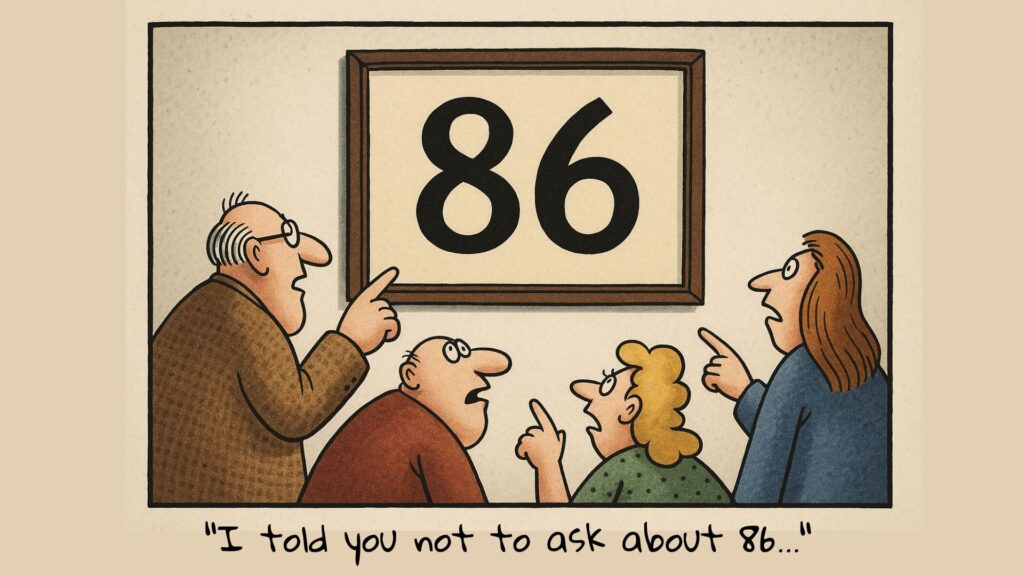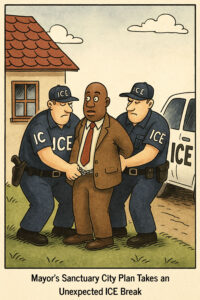 “Eighty-six” (or “86”) is an American English slang term widely used in restaurants, bars, and beyond to mean to refuse service, get rid of, or cancel something or someone. In diner and bartender lingo, “86” originally indicated an item was sold out or a customer should be ejected. Over the decades, it has entered general use with the broader sense of “throw out” or “eliminate”. Despite its popularity, the exact origin of “86” remains a subject of debate, spawning numerous folk etymologies. This report investigates the earliest documented uses of “86,” traces its emergence, examines all major origin theories (from soda-fountain codes to Prohibition-era lore, rhyming slang, military jargon, and more), and evaluates the credibility of each. It also provides historical and contemporary examples of “86” in use and discusses how its meaning has evolved, including modern extensions in politics and pop culture. Finally, the term’s spread (or lack thereof) outside the United States is addressed. The goal is a clear, evidence-based account of what we know (and don’t know) about this enigmatic number.
“Eighty-six” (or “86”) is an American English slang term widely used in restaurants, bars, and beyond to mean to refuse service, get rid of, or cancel something or someone. In diner and bartender lingo, “86” originally indicated an item was sold out or a customer should be ejected. Over the decades, it has entered general use with the broader sense of “throw out” or “eliminate”. Despite its popularity, the exact origin of “86” remains a subject of debate, spawning numerous folk etymologies. This report investigates the earliest documented uses of “86,” traces its emergence, examines all major origin theories (from soda-fountain codes to Prohibition-era lore, rhyming slang, military jargon, and more), and evaluates the credibility of each. It also provides historical and contemporary examples of “86” in use and discusses how its meaning has evolved, including modern extensions in politics and pop culture. Finally, the term’s spread (or lack thereof) outside the United States is addressed. The goal is a clear, evidence-based account of what we know (and don’t know) about this enigmatic number.
Earliest Documented Uses and Timeline of Emergence
The slang “86” began appearing in American usage in the early 1930s, particularly in the context of lunch counters and soda fountains. The first known print appearance was in columnist Walter Winchell’s “On Broadway” column on May 24, 1933. Winchell published a glossary of Hollywood soda-fountain slang contributed by a soda jerk, including the entry: “‘Eighty-six’ means all out of it.” In the same column, other numeric codes were listed (for example, “81” meant a glass of water, and “13” warned that the boss was around). This suggests “86” was part of a pre-existing numeric code system among service staff by 1933.
| Year | Development |
|---|---|
| 1933 | First known print appearance in Walter Winchell’s column as soda-fountain slang for “all out of it.” |
| 1936 | Documented in American Speech as diner slang for an item not available. |
| 1942 | Washington Post crime story confirms “86” as slang for throwing someone out or canceling something. |
| 1950s–60s | “86” becomes common in American slang, shifting from diners to mainstream usage. |
| 1970s | Acquires the meaning “to kill or destroy” in some contexts. |
| 1980s–1990s | Broadens into general idiomatic use: “86 that idea” or “86 the customer.” |
| 2000s–2020s | Remains common slang in restaurants, bars, and broader American English. |
Theories About the Origin of “86”
Many colorful stories attempt to explain why “86” came to mean “throw out” or “none left.” Some theories focus on Prohibition-era New York, others on military jargon, rhyming slang, or various numeric coincidences.
| Proposed Origin | Explanation | Credibility |
|---|---|---|
| Soda Fountain Code (1930s) | “86” was diner/soda-jerk code for “all out of it.” | Strong – Earliest documentation, most accepted by historians. |
| Rhyming Slang “Nix” | “Eighty-six” rhymes with “nix,” meaning “nothing” or “cancel.” | Plausible – Supported by linguists, but no direct documentation. |
| Chumley’s 86 Bedford St. | Prohibition speakeasy allegedly used “86” as a warning for raids. | Doubtful – No evidence of this use at the time. |
| Great Depression Soup Kitchens | 86th person in line would not get served. | Doubtful – No documentation found. |
| Military Article 86 (AWOL) | Absence without leave. | Unrelated – Coincidental numbering. |
| 86th Street Subway/El | End of the line for drunken passengers. | Unsubstantiated – Urban legend. |
Historical Usage and Evolution of Meaning
From its early days at lunch counters, “86” expanded from a narrow in-house code to a common American expression. It evolved from referring to menu items that were out of stock to the broader act of removing or ejecting someone. Over time, it transcended its food-service roots and became a part of mainstream American slang. This section will explore the timeline of its evolution, notable cultural references, and how it has been adapted in modern language.
Modern Extensions and Cultural Impact
The term “86” is still widely used in American restaurants and bars, but its application has broadened. It is now commonly used in political, social, and even technology contexts to signify cancellation or removal. The phrase has also found its way into pop culture, music, and literature, symbolizing exclusion or termination in a vivid, shorthand way.
International Spread and Usage
While common in American English, “86” has not spread widely outside the United States. However, in international hospitality sectors influenced by American restaurant chains, it is sometimes used as a professional term. Outside of this context, it is less understood and often requires explanation to non-American audiences.
Conclusion
“86” is a rare linguistic gem—a bit of diner slang that broke free of its original setting and became a vivid, punchy part of American English. Its mysterious origins only add to its charm, and its adaptability ensures it will likely endure for years to come.

